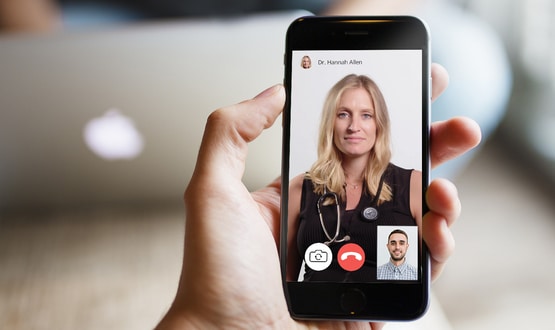Funding model for GP at Hand ‘not appropriate’, Ipsos Mori review finds

Policy makers should consider a new funding model for Babylon’s GP at Hand as current models may not be “appropriate”, an independent review into the provider has found.
A review into the NHS-funded service was commissioned in 2018 after NHS England lodged a “formal objection” to a significant further roll out of the service. NHS England along with Hammersmith and Fulham Clinical Commissioning Group (CCG) issued a tender on 6 March 201 and for a £250,000 contract for an “independent evaluation” of the service.
Published on May 23, the long-awaited Ipsos Mori evaluation was “not able to fully address” whether the service is affordable or sustainable.
The authors state policy makers need to consider the “appropriateness” of the current funding formula for the service, the Global Sum Allocation Formula, which is based on population demographics and illness profiles but “doesn’t take into account demand for services”.
“Further research would be required to understand whether the higher use of primary care services was a product of specific health concerns or simply due to better accessibility,” the report said.
“Consideration also needs to be given to the additional costs associated with the observed high levels of patient turnover in GP at Hand.
“Further research would need to focus on whether this would be likely to be sustained if digital first services were mainstreamed.”
The number of registrations for GP at Hand has reached almost 50,000, with as many as 500-1,000 new patients signing up each week. A “significant number” also de-register each week, around one in four patients compared to one in six in other GP practices, the report notes.
Babylon has previously faced heavy criticism for accepting patient registrations outside the borough of Hammersmith and Fulham, where it is registered as a provider. As little as 5% of GP at Hand’s patients live in Hammersmith and Fulham.
Furthermore, GP at Hand’s current advice that patients should be able to attend face-to-face appointments if necessary, “clearly limits” the type of patients able to use the service and means those with the greatest need – those with complex issues and comorbidities – will benefit least, the report found.
The reliance on a smartphone also suggests those less comfortable with the technology are less likely to use it, leading to “potential implications for health inequalities”.
This “raises questions” about the financial impact on the wider health system because “there are costs attached to dealing with patients with complex needs that Babylon GP at Hand is not incurring”.
While feedback on satisfaction of the service is high, feedback on the face-to-face aspect is “generally poor” and some patients say they are “unlikely” to travel for a face-to-face appointments if deemed necessary.
This could put added pressure on other services like NHS 111, which Babylon recommends if they are too ill to travel; patients may not attend screening appointments; and there are fewer opportunities for health promotion and prevention activities seen as a key role in general practice, the report concluded.
It echoes similar concerns that GP at Hand ‘cherry picks’ younger, healthier patients, taking resources away from local NHS general practices that offer long-term care to all.
GP at Hand has faced fierce criticism and calls to be banned over fears the service drains money from NHS practices that offer long-term care for all.
A spokesman for Babylon said: “However funding is agreed, administrative systems shouldn’t stand in the way of patient care. We are currently seeing a financial system that was not designed to meet the needs of people who choose digital-first care.
“Many people don’t realise that the current model for funding NHS GP clinics is based on the Carr-Hill formula. It weights payments by age and gender, as well as other factors so that practices are paid depending on who registers with them. The amount varies from below £35 per 15-44 man, to over £190 for each person over the age of 85.
“With the current formula, this means Babylon GP at hand receives approximately 40% less funding per patient than the national average, despite offering more than three times the contracted hours by being open 24/7/365.”
In response to concerns raised in the report about patients with complex needs and comorbidities not benefiting from the service, the spokesman added: “We have introduced a number of innovations to help care for patients with complex needs, including our Care Coordination Team.
“Many GP practices pay particular attention to the 1% of people who are at high risk of admission to hospital, such as elderly patients on multiple medications, and produce a care plan for them. We do this and more – our GPs support the 1% who need care plans, but our Care Coordination Team supports an additional group with the very highest needs such as complex mental health issues; multiple medical problems; or addiction, and helps them with everyday living.
“Specifically on patient retention, our latest figures show that we are matching the average rate for London practices. It’s our ambition to make our service so good that this rate will continue to drop and, as we expand with more clinics across the UK we expect that people will stay with us even if they are moving to a new job or home.”
Dr Richard Vautrey, British Medical Association committee chair, said digital developments should always be done with all patients in mind, “not just a select few”.
“This long overdue report reflects, and provides clear evidence backing, many of the concerns we have been raising for some time about GP at Hand,” he said.
“That is why we have consistently expressed genuine reservations about a system that has been rushed-out with little regard for how it impacts patients, practices and the wider healthcare landscape,” he said.
“Others, such as older patients with more complex conditions, and those without access to smartphones, are unsurprisingly not using the service, and therefore there must be serious consideration over whether rapid expansion within the NHS would create a two-tier health system.
“Ultimately, the NHS must decide what it wants to prioritise, quick access or continuity and quality of care, because one is likely to come at the price of the other.”
The MP for Hammersmith, Andy Slaughter, recently called on the health and social care committee to carry out an inquiry into GP at Hand, suggesting Hammersmith and Fulham CCG was facing potential additional costs of more than £20million in order to continue funding the service.
In January 2018, Digital Health News reported on how NHS England had lodged the objection to plans for a significant further roll-out of Babylon Healthcare’s GP at Hand. These plans were first revealed in a clinical review of the service by Hammersmith and Fulham CCG.
The review added that the GP at Hand service has not been “formally evaluated”, which could result in “unintended consequences”, but added the “innovative” service would be “potentially transformative”
[themify_box icon=”info” color=”gray”]
Other key findings of the report include:
-
- Satisfaction for most patients is high but only in relation to access. The evaluation has not concluded GP at Hand’s model is “optimal” for patients, as instant access to a GP “does not need to be delivered through an app”
- The model meets the needs of a specific segment of the population with relative low level of need, raising questions about the extent to which the service is valid for a more diverse group
- Not enough is known about why patients are currently deregistering at a high rate and this remains a “key gap”
- The GP workforce needed to deliver the service will need to continue to grow at a “significant rate” to support expansion. An embedded IT infrastructure would also be needed.
- GPs often work outside the communities they serve which implicates their understanding of the community and local services
- The service has reduced the number of patients presenting to A&E and calling 111. On average GP at Hand patients had 38 fewer A&E visits per 1,000 patients. But when compared to other patients joining a new GP service the same thing happened. The evaluation was not able to show if GP at Hand had an impact on wider health service use, whether positive or negative
- Analysis of the overall efficiency of the service raises significant questions about possible transferability and scalability of the model to other areas and wider groups of patients
- GPs are “very satisfied” with working for GP at Hand, due to better work life balance and development opportunities. Policy makers and professionals should learn from the staff satisfaction at the service.
[/themify_box]




1 Comments
Funny no one thought of this before permitting Babylon to put Hammersmith CCG millions into the red.
Comments are closed.